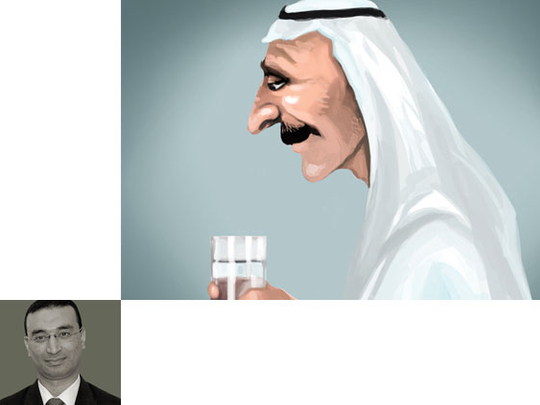
Without water nothing can happen on Earth. No single creature or race can live or perform any activity without water. Without water, the ecological balance cannot be maintained. Thus one can say that one who has water resources in the appropriate quantity and quality, can possess the world.
The water issue is complex and includes many sub-issues such as shortages, pollution, quality, allocation and cost.
Water has become a national security issue in the Arab world. Most Arab countries are below the water poverty line, meaning that the average availability per capita per annum is lower than the critical amount of 1,000 cubic metres, which is used as an indicator of the presence of a chronic water crisis. Many Arab countries are forced to rely on desalination technology which is expensive and polluting.
On an average, about 65 per cent of the available water resources in the Arab world come from outside. And most, if not all, of the rivers and canals outside the Arab world are the subject of a legal or political dispute.
At about 80 per cent on an average, agriculture takes the lion’s share of water in the region despite its meagre contribution to gross domestic product. Agriculture accounts for 30 per cent of Sudan’s GDP, and between 15-20 per cent in Egypt, Morocco and Syria. It accounts for less than 1 per cent in a number of Arab Gulf states.
In addition, the poor water transport networks in most Arab countries lead to thousands of cubic metres of water being wasted.
In many Arab countries, there are instances of drinking water scarcity, especially in the summer. This is against people’s right to water. Besides, many health problems such as vomiting, diarrhoea and kidney failure are caused by polluted drinking water.
In Egypt, for example, cases of kidney failure exceed five times the global figures.
With respect to justice, distributing water to metropolitan areas and high-income neighbourhoods at the expense of rural areas is a concern.
Contamination of waterways by industrial and agricultural pollutants also impacts fisheries. The phenomenon of mass mortality of fish in the River Nile in the area of Imbaba, Giza governorate, confirms this.
The provision of safe and clean drinking water is a social determinant of health, according to the interpretation of Article 12 of the International Covenant on Economic, Social and Cultural Rights.
The Millennium Declaration of the United Nations in 2000, under the principles of environmental protection, also calls for stopping the unsustainable exploitation of water resources by developing water management strategies at the regional, national and local levels to promote access to both equitable and sufficient quantities of water.
The UN General Assembly has adopted Resolution No 64/292 of the human right to water and sanitation. The text of the resolution emphasised the importance of everyone getting equal access to safe and pure drinking water and sanitation as an integral part of the realisation of all human rights. The resolution emphasised the responsibility of the state to protect the right to water so as to achieve equity and equality. It considered that the right to safe and clean drinking water is part of the right to life.
So one can conclude that the realisation of the right to water and provision of a basic living standard or the so-called Basic Line Life principally requires water availability in adequate quantities and appropriate quality.
Therefore the following guidelines are essential:
1. The state shall provide adequate safe and clean water to the whole population;
2. Water shall be provided at a cost that makes it accessible to all segments of the population, especially the vulnerable or marginalised and in rural areas.
3. In the context of water, the focus must be on cost recovery and not pricing.
4. Access to information on water and causes interruptions and scheduling …etc.
5. The integrated management of water resources should be adopted and the use of various policy instruments (laws, incentives and education) in order to rationalise water usage.
6. More attention must be paid to water demand management, not only supply management, as is the case in most Arab countries.
7. Improve the efficiency of water transport networks.
8. Rationalise subsidies in the various sectors consuming waters, especially the agriculture sector.
Water is a fundamental right of people and its availability to the population in the right quantity and quality is an appropriate manifestation of social justice and democracy.
All states must work to achieve this requirement on the ground to ensure that there are no complaints or protests by the people. This must go hand in hand with universally recognised environmental rights.
Dr Mohamed Abdel Raouf is an independent environmental researcher.








